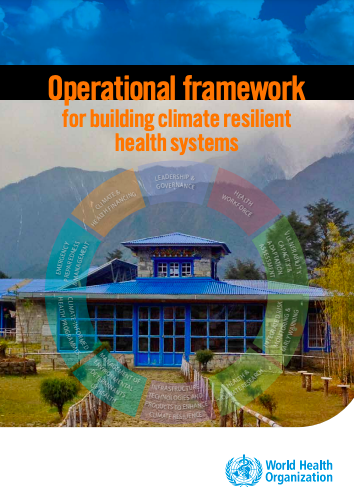
Currently Featuring
April 7, 2023
The health impacts of climate change will not be addressed without strong public health systems. This World Health Day – as people from around the globe come together to advocate for #HealthForAll – we take a look at the role of universal health care systems in protecting people from the myriad of growing health risks tied to our changing environment.
A community health center becomes flooded and loses power during a severe storm and is unable to provide essential obstetrics care and treat the injured people showing up for help. An agriculture worker experiences heat stroke, but is unable to receive life saving medical treatment without access to health insurance and ambulatory care. A national health system overwhelmed by a cholera outbreak following a flood finds little capacity to focus on other health crises.
These scenarios are just a few examples of the wide range of impacts the health sector faces as it increasingly grapples with extreme weather, disease epidemics, displacements, economic downturns, and infrastructure failures driven by climate change. When these shocks occur, critical services can be hindered just as people need them most – compounding risk and resulting in more illness and lives lost.
The importance of access to health services and information as a basic human right is universal, but we are still far from achieving universal health coverage. 30% of the global population is still unable to access essential health services, and almost two billion people face catastrophic or impoverishing health spending – with disproportionate impacts hitting those in the most vulnerable settings.
While those without universal health coverage face greater barriers to accessing care overall, service delivery can be severely impacted by climate hazards even in areas where healthcare is advanced, accessible and affordable. Climate-resilient universal healthcare systems are a core requirement to achieving equitable and meaningful protections from the health impacts of climate change.
Climate resilient health systems are able to anticipate, respond to, cope with, recover from and adapt to climate-related shocks and stress, to bring sustained improvements in population health, despite an unstable climate.
The design and maintenance of public health infrastructure may be the most important, cost-effective and urgently needed strategy for healthcare systems to adapt to our changing climate. Infrastructure designed to reduce vulnerability enables healthcare systems to operate as intended when faced with both acute and chronic climate shocks and stressors. This includes both healthcare infrastructure (such as flood control systems, air conditioning, generators etc.) – as well as the public infrastructure that supports healthcare systems and healthy communities (such as water and sanitation systems, laboratories, access roads etc.).
Universal health coverage is a political and social choice, and the World Health Organization (WHO) is calling for strong political leadership and public support for #HealthForAll.
The World Meteorological Organization (WMO) – WHO Joint Office for Climate and Health supports WHO’s calls for Universal Health Coverage as a key step towards protecting all populations from the worst impacts of climate change.
On the climate services side, WMO is leading the charge to ensure that everyone on Earth is protected by early warnings in the next 5 years – meaning all health systems will have sufficient time to prepare for impending hazards – through its Early Warnings for All initiative.
Strengthening health systems, including healthcare facilities, is a key part of health adaptation planning, and should be included in each country’s Health National Adaptation Plan. At the same time, action to mitigate and adapt to climate change is urgently needed to lessen climate-related burdens on health systems.
In addition to building climate-resilient healthcare systems, we must take advantage of all opportunities to reduce climate emissions from the healthcare sector, both to put health systems on a climate-smart development path, and align the sector with global climate goals.
Learn more: